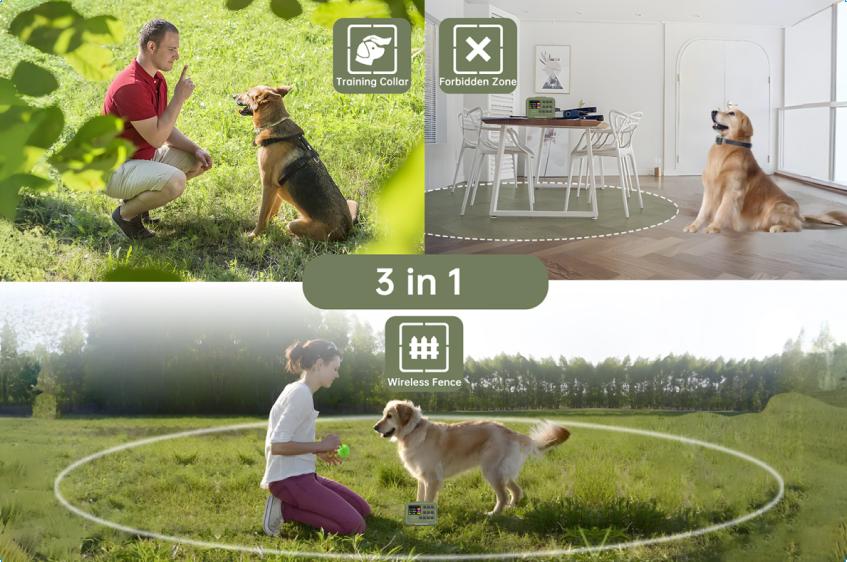Border Collie Complete Guide: Temperament, Grooming, Lifespan & Training Tips

Border Collies are often considered the most intelligent and agile of all dog breeds. Originally bred for herding sheep in the border regions of Scotland and England, this breed has grown in popularity not only for their work ethic but also for their companionship and versatility. In this comprehensive guide, we will explore every essential aspect of caring for a Border Collie—from their origins to training techniques and how modern tools like wireless dog fences can aid their development.
1. Breed Overview
| Attribute | Description |
|---|---|
| Origin | Scotland and England Border Region |
| Size | Medium (30-45 lbs; 18-22 inches tall) |
| Coat Types | Rough (long) or Smooth (short) |
| Lifespan | 12 to 15 years |
| Intelligence Rank | #1 (According to Stanley Coren) |
| Common Uses | Herding, Agility, Obedience, Pets |
2. Physical Characteristics
Border Collies are medium-sized dogs known for their sharp, alert expressions and athletic builds. Their coats can be rough or smooth and come in various color patterns including black and white, red and white, blue merle, and tricolor.
- Weight: 30 to 45 pounds
- Height: 18 to 22 inches at the shoulder
- Eyes: Brown, blue, or heterochromia (two different colors)
- Ears: Upright, semi-erect, or fully dropped
- Tail: Bushy and carried low unless excited
3. Temperament and Personality
Border Collies are highly energetic, intelligent, and eager to please. Their personalities make them ideal for active families or individuals who enjoy engaging with their dogs.
- Intelligence: Border Collies rank as the smartest dog breed.
- Work Ethic: Natural herders with an innate desire to work.
- Social Behavior: Friendly but may be reserved around strangers.
- Instincts: Strong herding instincts may lead to nipping behaviors.
4. Exercise and Activity Needs
Border Collies require more physical and mental stimulation than most other breeds.Without proper activity, Border Collies can become bored, leading to destructive behaviors.
| Activity Type | Recommended Frequency | Notes |
| Walks | 2x daily (30-60 mins) | Brisk pace; structured walks |
| Play Sessions | Daily | Fetch, frisbee, tug-of-war |
| Agility Training | 2-3x weekly | Helps with focus and energy expenditure |
| Mental Games | Daily | Puzzle toys, hide-and-seek, scent games |
5. Training & Intelligence Development
Training is not optional for a Border Collie—it is vital. Their high intelligence means they can pick up new commands quickly, but it also means they need consistent mental challenges.
Why Is Training So Important?
- Prevent Behavioral Issues: Like obsessive barking, digging, or herding children.
- Bonding: Builds trust and communication with the owner.
- Mental Health: Keeps their brain stimulated and happy.
Characteristics That Affect Training
| Characteristic | Impact on Training |
| High Intelligence | Learns commands rapidly; requires variety |
| Sensitivity | Responds best to positive reinforcement |
| Strong Focus | Can lock onto tasks but may ignore distractions |
| Energy Levels | Needs training that includes physical activity |
Best Training Practices
- Early Socialization: Start between 8-12 weeks
- Short, Frequent Sessions: 5-15 minutes, multiple times a day
- Use Rewards: Treats, praise, toys
- Mix It Up: Combine obedience, tricks, agility, and scent work
- Consistency is Key: Same words, same rules from all family members
Essential Commands to Teach
| Command | Benefit |
| Sit / Stay | Basic obedience |
| Come | Crucial for off-leash reliability |
| Heel | Prevents leash pulling |
| Leave It | Stops them from picking up harmful objects |
| Go to Place | Helps them calm down and settle in one area |
Integrating Technology: Wireless Dog Fences
As Border Collies love to run and explore, keeping them within a safe area can be challenging. This is where wireless dog fences come in handy.
What Is a Wireless Dog Fence?
It is an invisible boundary system that uses GPS or radio signals. When the dog gets close to the set perimeter, the collar emits a tone or mild correction to encourage them to stay within the safe zone.
Benefits for Border Collies
- Freedom Without Risk: Allows them to explore without physical barriers
- Supports Training Goals: Reinforces recall and boundary training
- Customizable Zones: Especially useful for large properties or travel
- Easy to Set Up: No digging or fencing required
| Advantage | Description |
| Enhanced Safety | Prevents running into traffic or chasing animals |
| Mental Reinforcement | Teaches them where they are allowed to roam |
| Complements Obedience | Integrates well with voice commands like “Come” or “Stay” |
| Ideal for Rural Homes | Great for open spaces where physical fencing isn’t viable |
Training Tips with Wireless Fences
- Start Slow: Walk the dog along the boundary with visual flags first
- Use Verbal Cues: Reinforce with “back” or “come” when near edge
- Reward Success: Praise when they stay within safe zone
- Monitor Closely: Especially during the first 1-2 weeks
6. Grooming Needs
Depending on the coat type, grooming needs can vary.
| Grooming Task | Frequency | Notes |
| Brushing | 2-3x/week | More often for rough-coated Collies |
| Bathing | Every 6-8 weeks | Too frequent baths can dry skin |
| Nail Trimming | Monthly | Check for cracking or splitting |
| Ear Cleaning | Weekly | Prevents infections |
| Teeth Brushing | 2-3x/week | Use dog-safe toothpaste |
7. Health Considerations
While generally healthy, Border Collies are prone to some genetic conditions.
| Condition | Symptoms | Prevention/Management |
| Hip Dysplasia | Lameness, difficulty walking | Hip scoring, avoid overexertion |
| Collie Eye Anomaly (CEA) | Vision impairment | Genetic testing before breeding |
| Epilepsy | Seizures | Medication and regular vet care |
| Osteochondritis | Joint pain in young dogs | Balanced diet, avoid early strain |
8. Family Compatibility
Border Collies can be excellent family dogs if their needs are met.
- With Children: Great with older, respectful kids
- With Pets: May try to herd other animals
- With Strangers: Can be reserved, early socialization helps
Not ideal for sedentary families or first-time dog owners without time for training and exercise.
9. Living Environment Recommendations
| Environment | Suitability | Notes |
| Apartment | Low | Only suitable with heavy daily exercise |
| Suburban Home | High | Ideal with fenced yard or wireless system |
| Rural Property | Very High | Natural fit; space to run, herd, and play |
10. Fun Facts About Border Collies
- Border Collies can learn over 1,000 words (e.g., Chaser, the most famous one)
- They often “stare” at animals as part of their herding instinct
- A Border Collie named Striker holds the Guinness record for fastest car window opened by a dog
- Regularly dominate agility, obedience, and disc competitions
Frequently Asked Questions (FAQs)
- Are Border Collies good for first-time dog owners?
While Border Collies are loving and loyal, they are best suited for experienced owners due to their high energy and intelligence, which require structured training and daily engagement.
- How much exercise does a Border Collie need daily?
They need at least 1.5 to 2 hours of physical activity every day, along with mental stimulation such as puzzle games or agility work.
- Do Border Collies bark a lot?
They can be vocal, especially when bored or not mentally stimulated. Proper training and activity levels can help manage excessive barking.
- Are Border Collies good with other pets?
They generally do well with other dogs but may try to herd smaller pets due to their strong instincts. Early socialization is essential.
- Can a Border Collie live in an apartment?
It’s possible but not ideal. If you live in an apartment, you’ll need to commit to rigorous daily exercise and mental stimulation. Access to a nearby park or outdoor space is crucial.
At what age should I start training my Border Collie?
Start basic training and socialization as early as 8 weeks old. Their high intelligence means they can absorb lessons very quickly at a young age.
What are the pros and cons of using a wireless dog fence for a Border Collie?
Pros Cons Encourages safe, independent outdoor play Requires proper training to use effectively Easy to set up, no digging needed May not work well in areas with dense trees/buildings Portable and ideal for travel Not a substitute for supervision or engagement - What’s the difference between a smooth and rough coat Border Collie?
Rough-coated Collies have longer, feathered fur and require more grooming, while smooth-coated Collies have shorter, denser fur that’s easier to maintain.
- How long do Border Collies live?
With proper care, they typically live between 12 and 15 years.
- Are Border Collies hypoallergenic?
No, they are not. They shed moderately year-round and more heavily during seasonal changes.

